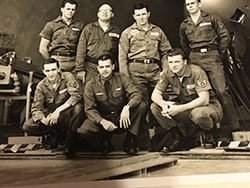
Air Force veteran and DAV life member Joseph Heeter wasn’t worried about toxic exposures when he was a young enlisted airman in 1954. But now, he believes the jet fuel that saturated his uniform is to blame for his history of cancers and other health issues.
And research seems to back his belief.
A February 2023 Department of Defense study found that aircrews had a 24% higher rate of cancer of all types compared with the rest of Americans, for reasons that are not yet clear. Ground crew members were also found to have a 3% higher incidence of cancers of all types. The study followed more than 156,000 aircrew members and 730,000 ground crew members between 1992 and 2017. A Phase 2 of the study to identify specific occupational and environmental risk factors was required due to the findings.
Jet fuel was just part of the job, according to Heeter, who spent six years as an aircraft mechanic overseas and more than 1,000 hours in the air working to diagnose issues as an in-flight mechanic. Breathing vapors and having your hands and arms covered in fuel and solvents was a reality, he said.
During his more than 13 years in uniform, Heeter’s assignments took him to Okinawa, Japan; Newfoundland, Canada; and numerous stateside bases where simple tasks required using the only thing available.
“We would wash our clothes in jet fuel,” Heeter said. “It was the only way we could get the grease out of them to get them presentable.”
His health issues started with mouth and gum problems as his military service was ending in 1967.


“In 1972, I lost all but four of my teeth from gum disease,” Heeter said. “My dentist and doctor asked what I did that deteriorated my gums.”
Heeter is also service-connected for chloracne due to Agent Orange exposure, despite not serving in Vietnam. The condition developed sores on his face, back and chest, and he required surgeries on his face. He has also had perpetual skin problems on his hands.
After leaving the military, Heeter developed cancers, starting with prostate cancer. That led to surgery to remove his prostate and nearby lymph node, he said. Next he developed lymphoma and needed intestinal surgery to remove three cancerous tumors. He’s also had three types of skin cancer removed, including malignant melanoma.
In addition to the 2023 DOD study, a May 2023 presentation by a toxicologist to the Veterans Health Administration noted that jet fuel is one of the most common exposures in military service, yet there is lack of information on long-term outcomes. Since the burning of jet fuel in burn pits is already listed in the Honoring our PACT Act, the presentation focused on the respiratory effects of exposure to jet fuel.
Heeter hopes the PACT Act’s requirement for the Department of Veterans Affairs to report about the health effects of jet fuels to Congress will lead to answers—and additional care for air and ground crew members.
“Studying the effects of toxins used to maintain our military’s aircraft is a pivotal first step to understanding how they affect the human body in the long term,” said DAV National Legislative Director Joy Ilem. “We already know aircrews especially have higher rates of cancer than their civilian counterparts. Our country must do right by providing the proper care to toxic-exposed veterans.”





